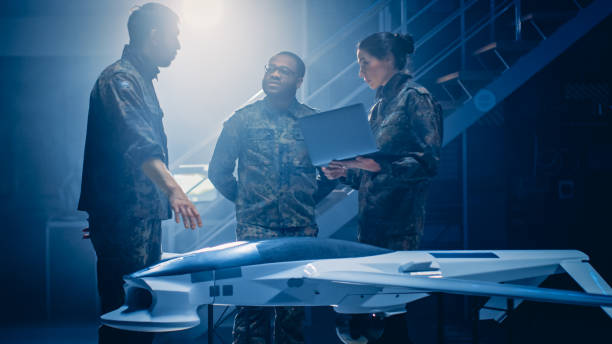
Cyber Intelligence Analyst in the Air Force
A Crucial Role in Modern Defense
Cyber intelligence analyst have become critically important in the modern era, where technology permeates every facet of life. The US-based armed forces (USAF) perceive this need and have created particular parts to counter digital dangers and safeguard public safety. Among these jobs, the Digital Knowledge Expert is a central participant in the battle against digital foes. This article investigates the obligations, preparation, abilities, and effects of digital knowledge experts in the air power industry, featuring their fundamental commitment to public protection.
The Role of a Cyber Intelligence Analyst
A cyber intelligence analyst in the Air Force is entrusted with recognizing, dissecting, and moderating digital dangers. Their fundamental objective is to protect military associations and information structures from unapproved access, computerized attacks, and data breaches. This incorporates a mix of mindful and unfriendly procedures, including the conspicuous verification of shortcomings inside the Flying Corps’ electronic structure and the improvement of countermeasures to baffle anticipated risks.
The scope of a Cyber Intelligence Analyst’s work is broad and dynamic. It incorporates observing organization traffic for strange movement, leading criminological investigation of digital episodes, and social event insight on arising digital dangers. These examiners work intimately with other network safety experts and knowledge organizations to share data and foster exhaustive guard methodologies. Their work is basic in guaranteeing that the Flying Corps stays strong against digital foes who are continually developing their strategies.
Training and Education
Becoming a cyber intelligence analyst in the Air Force requires formal education, technical training, and continuous learning. Competitors regularly need a foundation in software engineering, data innovation, or a connected field. The aviation-based armed forces provide broad preparation to equip experts with the abilities expected to deal with the intricacies of digital fighting.

Initial Training: Recruits undergo basic military training to instill the discipline and physical fitness required of all Air Force personnel. Following this, they go to specialized schools, where they get particular preparation in digital activities, network security, and knowledge examinations. This preparation covers many points, including programming, network conventions, cryptography, and digital criminology. examinations.
Advanced Training: Analysts may pursue advanced courses and certifications to deepen their expertise after initial training. These can integrate certifications like Insisted Information Systems Security Capable (CISSP), Reliable Moral Software Engineer (CEH), and CompTIA Security+. In addition, the aeronautics-based military presents advancing planning ventures to stay up with the latest headways in computerized development and dangerous information.
Continuous Learning: The field of cybersecurity is constantly evolving, and Cyber Intelligence Analysts must stay current with the latest trends and techniques. This requires a guarantee of persistent learning through both conventional instruction and self-study. Experts frequently participate in gatherings, studios, and online courses to extend their insight and abilities.
Key Skills and Attributes
To be viable in their jobs, digital knowledge examiners should have an extraordinary mix of specialized abilities, logical capacities, and individual credits. Next up are some of the basic capacities and characteristics that are key to results in this field:
Technical Proficiency: Analysts must have a strong understanding of computer systems, networks, and cybersecurity tools. This incorporates information on working frameworks, network conventions, firewalls, interruption recognition frameworks, and malware examination. They should likewise be capable of programming dialects like Python, Java, and C++.
Analytical Thinking: The ability to analyze complex data and identify patterns is crucial for identifying and mitigating cyber threats. Investigators should have the option to think fundamentally and tackle issues imaginatively. They need to evaluate the likely effect of dangers and foster successful countermeasures.

Attention to Detail: Cyber threats can be subtle and difficult to detect. Investigators should have a sharp eye for detail to recognize oddities and research dubious activities. This requires fastidiousness and a purposeful approach to their work.
Communication Skills: Communication is vital for sharing intelligence and planning with other network protection experts. Specialists should be able to convey their disclosures plainly and compactly, both in composed reports and verbal briefings. They must also work outstandingly in parties, collaborating with associates across different workspaces and affiliations.
Adaptability: The cyber landscape constantly changes, with new threats emerging regularly. Examiners should be versatile and ready to rapidly learn and carry out new methods and advancements. This requires adaptability and a readiness to embrace change.
The Impact of Cyber Intelligence Analysts
Cyber Intelligence Analysts in the Air Force significantly impact national security by protecting military infrastructure and data systems, ensuring operational readiness, and defending against cyber threats.
Defensive Operations: One of the primary responsibilities of cyber intelligence analysts is to shield military organizations against cyberattacks. This includes checking network traffic, perceiving shortcomings, and completing security endeavours to thwart unapproved access. By staying aware of good practices, specialists help safeguard sensitive information and essential establishments from being compromised.
Offensive Operations: In addition to defensive operations, cyber intelligence analysts play a role in offensive cyber operations. This includes gathering insight for foes, creating digital weapons, and leading cyberattacks to disturb adversary tasks. Hostile tasks can be utilized to corrupt foes’ capacities, stop future assaults, and assemble significant knowledge.
Incident Response: Cyber intelligence analysts are at the forefront of the response effort when a cyber incident occurs. They conduct a criminological examination to decide the source and extent of the assault, survey the harm, and foster an arrangement for healing. Their attitude is pivotal in alleviating the effects of digital occurrences and reestablishing ordinary tasks.
Intelligence Sharing: Cyber intelligence analysts work closely with other knowledge offices and network protection associations to share data and collaborate on safeguarding procedures. This planned effort produces a broad understanding of the perilous scene and enables more effective responses to advanced risks.
Training and Awareness: Cyber Intelligence Analysts also play a role in training and raising awareness among Air Force personnel. They lead instructional courses and studios to teach partners about network safety best practices and the significance of maintaining a solid computerized climate. By advancing a culture of online protection, examiners assist with diminishing the risk of human blunders and further developing their general security posture.
Challenges and Future Directions
The role of cyber intelligence analysts in the Air Force is challenging. The steadily developing nature of digital dangers implies that investigators should continually adjust and remain ahead of their foes. This requires constant learning and a proactive approach to online protection.
Evolving Threats: Cyber adversaries constantly develop new techniques and tools to exploit vulnerabilities. Examiners should keep up to date with these developments and expect possible dangers. This requires a profound comprehension of the danger scene and the capacity to think like an assailant.
Resource Constraints: The demand for skilled cybersecurity professionals often exceeds the available supply. This can prompt asset requirements, making it difficult to maintain satisfactory staffing levels. The aviation-based armed forces should continue putting resources into preparation and improvement projects to attract and retain top talent.

Collaboration and Coordination: Effective cybersecurity requires collaboration and coordination across different departments and agencies. This can be testing, especially in a huge and complex association like the Flying Corps. Investigators should attempt to identify major areas of strength for fabrication and encourage a culture of coordinated effort.
Technological Advancements: Rapid technological advancements can both help and hinder cybersecurity efforts. While new instruments and innovations can improve guard capacities, they can likewise present new weaknesses. Examiners should be proficient at utilizing innovation for their own benefit while dealing with related dangers.
Conclusion
The role of a cyber intelligence analyst in the Air Force is vital to national security in the digital age. These experts are entrusted with shielding military organizations and data frameworks from digital dangers and guaranteeing the functional status and adequacy of the Flying Corps. Through a mix of specialized capability, scientific reasoning, and successful correspondence, digital knowledge experts assume an essential role in guarding against digital enemies and protecting the country.
As cyber threats continue to evolve, the importance of cyber intelligence analysts will only grow. The Flying Corps should continue putting resources into preparation and advancement to guarantee that experts have the right stuff and information to address these difficulties. By remaining ahead of rising dangers and cultivating a culture of network safety, digital knowledge examiners will remain a basic part of the Flying Corps’ guard procedure, shielding the country from the consistently present danger of digital fighting.
What are the primary duties of a Cyber Intelligence Analyst?
Their duties include monitoring network traffic, conducting forensic analysis of cyber incidents, identifying vulnerabilities, developing countermeasures, and sharing intelligence with other agencies. They also participate in offensive cyber operations to disrupt enemy activities.







